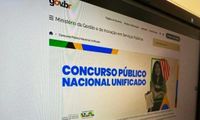The Brazilian government is gearing up for the second edition of the Concurso Público Nacional Unificado (CPNU), commonly referred to as the "ENEM of Competitions," which is set to take place in the second half of 2025. This much-anticipated exam, which attracted over 2.1 million candidates in its inaugural edition in 2024, is expected to introduce several significant changes aimed at enhancing the experience for participants and improving the overall efficiency of the selection process.
Esther Dweck, the Minister of Management and Innovation in Public Services (MGI), confirmed in a recent interview that the government plans to maintain the test date in August, as it is the month with the lowest rainfall in Brazil. This decision also takes into account the impacts of flooding in Rio Grande do Sul in 2024. Importantly, Dweck noted that there will be no competition in 2026 due to the electoral calendar, which complicates the organization of public exams.
One of the most notable innovations for the CPNU 2025 is the replacement of traditional bubble filling with a barcode system that automatically identifies candidates. This change is intended to eliminate common errors, such as failing to mark the correct type of answer sheet or miswriting required information. Dweck emphasized that "the machine can read and ensure that the test belongs to that person. We want candidates to focus solely on the content of the exam, not on bureaucratic formalities." This new system is expected to accelerate the correction process and the announcement of results, which in 2024 were delayed by 194 days due to a judicial agreement with the Federal Public Ministry.
In addition to the barcode system, the CPNU 2025 will feature a single public notice, consolidating the previous eight separate notices into one comprehensive document. This unification aims to simplify the process for candidates and provide clearer guidelines. Each question booklet will also carry a unique code that does not reveal the candidate's identity, ensuring impartiality in the grading process.
The second edition of the CPNU will introduce two new higher-level careers: Technical Analyst of Justice and Defense and Technical Analyst of Socioeconomic Development. These positions are designed to meet the demands of various government sectors and will allow for greater flexibility in the deployment of personnel across federal agencies.
Inclusivity remains a core focus of the CPNU 2025. The government will continue to uphold its policy of quotas for black, indigenous, and disabled candidates, as well as specific positions for indigenous people within the National Indian Foundation (FUNAI). Additionally, a national campaign to encourage female participation in the competition will be launched, particularly in technical fields such as Information Technology (IT), where women represented only 8% of successful candidates in the first edition. Dweck highlighted the alarming gender disparity, stating, "While women comprised 52% of registrants, only 41% were approved. This reflects a structural problem that begins with professional choices and perpetuates through competitions."
To further support female candidates, the MGI is considering implementing a bonus system similar to that used by the Ministry of Foreign Affairs (MRE), which awarded additional points to female candidates in its recent diplomatic exam. Such measures aim to address gender imbalances and promote greater equity in access to public service opportunities.
The timeline for the CPNU 2025 is still being finalized, with the Term of Reference for hiring the organizing bank expected to be published in April 2025. Registrations are anticipated to open in the second half of the year, with exams scheduled between September and November. The final results will be announced by June 2026, adhering to the legal restrictions imposed by the electoral calendar.
As the government prepares for the upcoming competition, it is also consolidating the list of participating agencies, which is expected to include more than 20 federal bodies. The first edition of the CPNU, held in 2024, marked a significant shift in the recruitment of federal public servants by centralizing multiple selections into a single exam, thus enhancing accessibility for candidates across Brazil.
The upcoming CPNU 2025 promises to be more inclusive, efficient, and accessible, with significant changes that reflect the lessons learned from the previous edition. As candidates look forward to this opportunity, they are encouraged to stay informed about updates regarding the schedule, the public notice, and the details surrounding the organizing bank.




